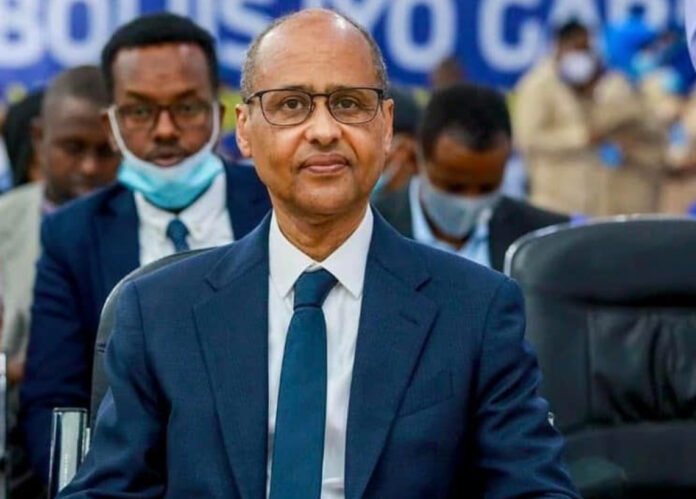Friday, July 4, 2025 — HAN
Source: Shabelle Media
Mogadishu — Somali Member of Parliament Dr Abdullahi Hashi Abib is facing growing public and political outrage over his persistent failure to attend Parliament and an intensifying pattern of inflammatory public claims, widely regarded as baseless and destructive.
Earlier this year, Dr Abib was suspended from the House of the People by Speaker Sheikh Aden Mohamed Nur (Madobe) due to chronic absenteeism. The decision, endorsed by a large majority of parliamentarians, followed repeated warnings over his consistent neglect of legislative duties. Lawmakers described the suspension as necessary to preserve the dignity of Parliament. “We expect representation, not disruption. Somalia’s challenges require cooperation, not constant antagonism. Parliament is not a platform for personal grievances,” said one MP in remarks to Shabelle.
Dr Abib has claimed his prolonged absences were due to security concerns, a justification that colleagues have labelled as false and evasive. According to several lawmakers, the claim is being used to shield himself from parliamentary accountability and scrutiny.
Despite his non-attendance, Dr Abib has continued to receive his monthly salary of around $5,500. This has prompted strong criticism from MPs and civil society alike, who question how a public servant absent from his duties can justify collecting public funds. “It is a shame that he draws a salary from Parliament every month while actively undermining the very citizens who fund it. He makes no effort to support tax collection in his own region, yet he dares to turn against the same people who pay his wages. He is not only ungrateful but driven by hatred towards certain people,” said one MP from South West State.
Critics argue that Dr Abib’s hostility towards the government escalated after he was overlooked for a ministerial post in the Council of Ministers, a position he had aggressively sought. The role was instead given to Dr Elmi Mahamoud Nur, who comes from the same clan. Since then, colleagues report that Dr Abib’s behaviour has deteriorated sharply. Parliamentary sources describe his actions as erratic, obsessive and increasingly personal. “He has lost all sense of purpose. He is consumed by resentment and personal grudges and he no longer acts with any regard for the country’s needs,” said one veteran MP.
Following the cabinet reshuffle, Dr Abib began launching repeated attacks against government institutions and public officials. He has singled out agencies responsible for finance, foreign affairs, education, public works and international cooperation. Lawmakers interviewed by Shabelle describe him as disconnected from reality and deliberately attempting to damage key national institutions. Many now refer to him as the “defamer-in-chief”, accusing him of “spreading lies” to sabotage public confidence.
Dr Abib’s social media activity has also raised concern. In one widely circulated post, he claimed that 95 percent of aid to Somalia is being looted, with Nairobi-based intermediaries acting as laundering channels. This allegation has not been verified and no evidence has been provided. He further alleged that $100 million from the Green Climate Fund was embezzled by what he called the “Qawlaysato mafia”, involving Somali and Djiboutian elites. No official investigation or credible report supports these claims.
Perhaps most serious is his accusation targeting the Ministry of Foreign Affairs and International Cooperation, in which he claimed that the State Minister was involved in trafficking. Legal experts and political analysts dismiss this as a reckless and malicious attack. “This is not oversight. This is defamation,” said one senior analyst. “He is not pursuing truth. He is running a vendetta campaign and using wild claims to discredit institutions and individuals who have done nothing but serve the country.”
Multiple parliamentarians who have worked closely with Dr Abib have raised concerns about his “mental wellbeing”. Some describe a noticeable decline in his judgement and behaviour. “He is not acting rationally. It is becoming dangerous. He lashes out without any evidence and it is clear he has serious issues he is hiding behind his position as a member of Parliament,” said one MP.
Dr Abib no longer participates in internal meetings or committee work and only appears in public to issue more accusations. His standing among fellow MPs has collapsed. Once seen as an articulate voice in Parliament, he is now viewed as a disruptive figure obsessed with personal grievances.
Civil society leaders also condemn his behaviour. “At a time when Somalia faces urgent economic, security and environmental challenges, this kind of conduct is more than unhelpful. It is harmful,” said one civic activist. “We cannot afford to be distracted by a man consumed by vendettas. Our national focus must be on building credible institutions and securing a future for our people.”
This report marks the beginning of a broader investigation by Shabelle Media Network into public accountability, with a specific focus on the conduct of MP Abdullahi Hashi Abib. As Somalia works toward stability, progress and governance reform, those entrusted with national responsibilities must be held to the highest standards of discipline and truth. Further reporting will follow.





